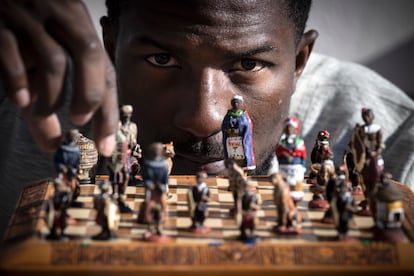Teddy Kossoko, the engineer who uses video games to do politics in Africa
The Central African entrepreneur develops mobile apps that teach young people about the continent


For Teddy Kossoko, “video games allow people to enter into an environment and leave with the sense of having lived through things, which is hard to do, for example, with a book or even a movie.” That’s why the young entrepreneur chose them as the right channel to end ignorance about Africa. Through video games, he brought together his two passions, programming and history, with a clear objective: start to balance the scale of the underrepresentation of the continent.
“In Africa, we have always seen stories through the eyes of others. The Americans are the ones who save the world. Why can’t it be an African?,” asks the software engineer, who specializes in aerospace engineering. Reinvented as a video game designer with a transformative pedagogical focus, Kossoko participated in Emerging Valley, a meeting of African startups and investors in Marseille, where he gave this interview.
Kossoko arrived in France a little more than a decade ago to continue with his studies. In 2018, recently graduated, he decided to take a chance on his passion. His first project was Kissoro Tribal Game, a mobile video game that simulates the mechanics of a traditional game played across the continent, which involves distributing seeds across a board of holes. Kossoko used the game’s name in the Central African Republic, kissoro, which is related to variants like awalé in the Ivory Coast, adji in Benin and wali in Mali, among others. The young developer reinvented the game with an African-inspired background to emphasize the value of the continent’s culture and awaken an interest in its history.
The game was well-received, and it achieved Kossoko’s goal: to use video games to make visible African tradition and realities. “I have no interest in making games about Alexander the Great. My interest is opening up people’s vision, whether Africans or Europeans, about what Africa is, beyond the Africa of the 54 countries that we know today. Many people don’t know what there was before, pre-colonial kingdoms, et cetera,” he explains. That is the task of Masseka Game Studio, the development company created by Kossoko.
The young Central Africa refers to how video games have popularized South Korean and Viking culture. “We have a group of projects that try to accent our cultures, so that people can discover them and they can have that visibility,” continues the unconventional video game developer.
After the success of Kissoro Tribal Game, Masseka studio released Golden Georges, a soccer game designed for mobile phones. The user plays the part of George Weah, the only African soccer player to receive the Ballon d’Or and the current president of Liberia. “We released this game with the intention of using sports to teach values of resilience, hope and a spirit of improvement, and to do so with African references,” Teddy Kossoko explains.
Conventional application platforms go through payment through a bank card, but banking on the African continent is very weak, especially among young people, the largest audience for video games
In his immersion in the promising universe of video games in Africa, the entrepreneur has confronted other difficulties, and he has decided to make his contribution: “The other part of my work in this industry is to help structure the gaming ecosystem in Africa. Today it is really difficult to generate resources from games produced on the continent.”
Most of the video game market is mobile-based, and conventional application platforms receive payment via bank card. But much of the African continent does not use banks, particularly young people, who are the primary audience for video games. To address that potential obstacle, Teddy Kossoko founded the online game and e-book store Gara, oriented towards African creators and adapted to the particularities of the continent’s market (for example, through payment via mobile money). One of the difficulties is that mobile money systems tend to operate on a national level, so those behind Gara have created a network of alliances with local operators.
Kossokoo believes that one country alone cannot build a solid market and ecosystem in the video game industry. “We have to have strength in numbers to make projects viable, so that the Moroccans can sell in Senegal, the Senegalese can sell in Zimbabwe, the Zimbabweans can sell in Tanzania.”
A political tool
“I have a particular relationship with video games,” confesses the head of Masseka Game Studio. “I see them as a tool, because, in reality, I’m not a gamer. I don’t have time,” he jokes. He sees games, he emphasizes, from a historical and political perspective, a potential tool. And he warns that everything in them is charged with subliminal messages, from a message on a wall, to how the characters are portrayed, the music and the sets.
He is also interested in their impact, their capacity for causing reflection and making their players feel: “They are the condensation of diverse languages and industries: animation, design, music, text, reading. For me, it is the most perfect creative-cultural industry that exists. Using it correctly can reach political goals and transform people.” For Kossoko, those political objectives are, in his words, “to tell about Africa and deconstruct the images of the continent integrated into peoples’ minds.”
“Whether we like it or not, we have in our minds a series of constructions that are not necessarily historic facts. There are also manipulations, conditionings, in a world that comes directly from a long period of slave trade, followed by colonization,” the young man says. Against the generalized “intellectual laziness,” he says, he thought of two options: use video games or create a political party. “But I couldn’t make a political party at a planetary scale,” he laughs. There is another strength that he finds in the creative industry that he has entered: “Through that tool I can reach many people in all corners of the world.”
Most young Africans know Europe better than Africa. At school they study the first two world wars, the French Revolution and other things that have nothing to do with their own stories.
The Central African entrepreneur is conscious that the change in the imaginary of Africa is necessary in the Global North, who need to learn about unfamiliar historical and cultural realities, but also among Africans. “Most young Africans know more about Europe than Africa. In school they study the first two World Wars, the French Revolution and many other things that have nothing to do with their own realities, with their own stories. However, when we talk, for example, about decolonization movements, we often remain on a superficial level,” the developer says.
Passionate about history, he believes that there is little knowledge about the pre-colonial period and the great kingdoms, but also about what happened in the early moments of independence: “Our challenge is to explain to Africans Africa before the Europeans arrived.”
His studio combines projects that bring visibility to African realities with others that draw attention to little-known historic periods. Africars is a racing game with the cars typically seen in African cities and racetracks inspired by the continent. The Legend of Mulu is a game that is planned for the platform The Sandvox, a pioneering virtual game environment in the metaverse, which simulates African scenes. The project’s protagonist is a heroine who visits Pygmy towns in the trees, Maasai villages, Dogon settlements and Peul campsites, where she learns ancestral knowledge to fulfill her mission of saving her people and her world from sorcerers.
“There is a difference between purely commercial games and the ones that have a political vision,” Teddy Kossoko says. He insists: “For me, video games in Africa today have to be educational-political. We can combine entertainment and politics to get the message through. If we manage to do it, it will be great, like when you have a good math teacher who helps you understand everything quickly, without noticing the difficulty.”
Sign up for our weekly newsletter to get more English-language news coverage from EL PAÍS USA Edition
Tu suscripción se está usando en otro dispositivo
¿Quieres añadir otro usuario a tu suscripción?
Si continúas leyendo en este dispositivo, no se podrá leer en el otro.
FlechaTu suscripción se está usando en otro dispositivo y solo puedes acceder a EL PAÍS desde un dispositivo a la vez.
Si quieres compartir tu cuenta, cambia tu suscripción a la modalidad Premium, así podrás añadir otro usuario. Cada uno accederá con su propia cuenta de email, lo que os permitirá personalizar vuestra experiencia en EL PAÍS.
¿Tienes una suscripción de empresa? Accede aquí para contratar más cuentas.
En el caso de no saber quién está usando tu cuenta, te recomendamos cambiar tu contraseña aquí.
Si decides continuar compartiendo tu cuenta, este mensaje se mostrará en tu dispositivo y en el de la otra persona que está usando tu cuenta de forma indefinida, afectando a tu experiencia de lectura. Puedes consultar aquí los términos y condiciones de la suscripción digital.








































